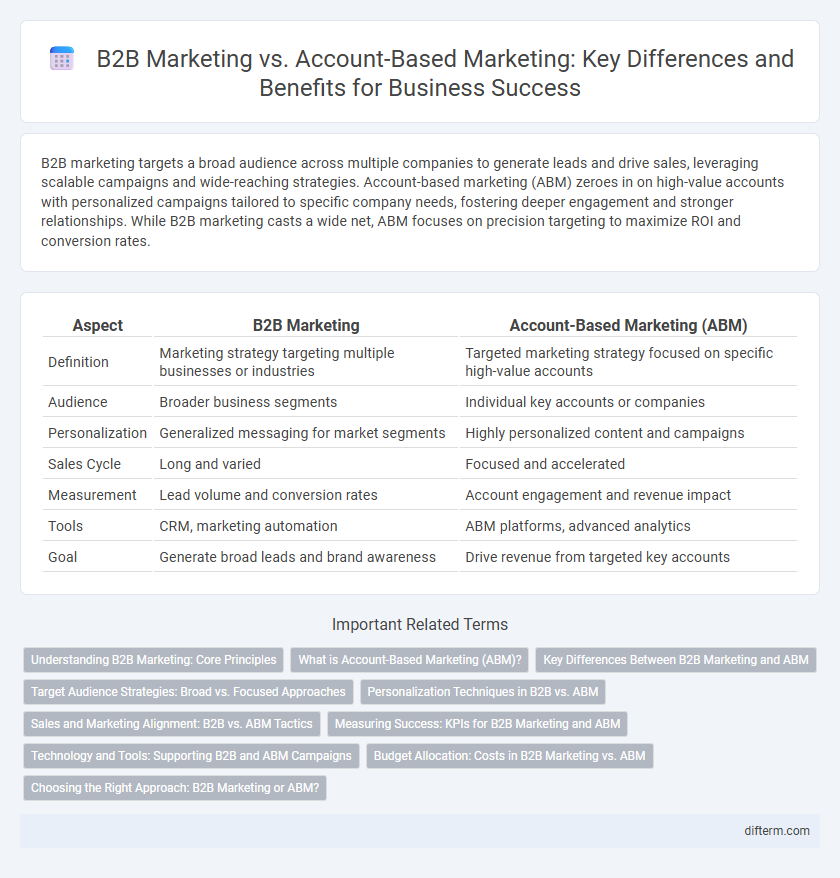B2B marketing targets a broad audience across multiple companies to generate leads and drive sales, leveraging scalable campaigns and wide-reaching strategies. Account-based marketing (ABM) zeroes in on high-value accounts with personalized campaigns tailored to specific company needs, fostering deeper engagement and stronger relationships. While B2B marketing casts a wide net, ABM focuses on precision targeting to maximize ROI and conversion rates.
Table of Comparison
| Aspect | B2B Marketing | Account-Based Marketing (ABM) |
|---|---|---|
| Definition | Marketing strategy targeting multiple businesses or industries | Targeted marketing strategy focused on specific high-value accounts |
| Audience | Broader business segments | Individual key accounts or companies |
| Personalization | Generalized messaging for market segments | Highly personalized content and campaigns |
| Sales Cycle | Long and varied | Focused and accelerated |
| Measurement | Lead volume and conversion rates | Account engagement and revenue impact |
| Tools | CRM, marketing automation | ABM platforms, advanced analytics |
| Goal | Generate broad leads and brand awareness | Drive revenue from targeted key accounts |
Understanding B2B Marketing: Core Principles
B2B marketing centers on building long-term relationships and delivering value to target businesses through tailored content, lead generation, and nurturing strategies. Core principles emphasize understanding the buyer's journey, segmenting audiences based on firmographics, and optimizing multi-channel engagement to drive conversion. This foundation contrasts with account-based marketing, which prioritizes personalized campaigns targeting specific high-value accounts for a more focused approach.
What is Account-Based Marketing (ABM)?
Account-Based Marketing (ABM) is a strategic B2B marketing approach focused on targeting specific high-value accounts with personalized campaigns tailored to their unique needs and pain points. Unlike broad B2B marketing tactics, ABM aligns sales and marketing efforts to engage decision-makers within targeted organizations, enhancing customer acquisition and retention efficiency. This method leverages data-driven insights and customized content to drive higher ROI and build long-term relationships with key business accounts.
Key Differences Between B2B Marketing and ABM
B2B marketing targets a broad audience of potential business customers through generalized campaigns, while Account-Based Marketing (ABM) focuses on highly personalized strategies aimed at specific high-value accounts. Unlike traditional B2B marketing, ABM aligns sales and marketing teams to nurture relationships with key decision-makers within target organizations, leading to higher conversion rates and ROI. The key differences lie in scope, personalization level, and strategic alignment, with ABM providing a more concentrated, account-centric approach compared to the broader market reach of B2B marketing.
Target Audience Strategies: Broad vs. Focused Approaches
B2B marketing employs broad target audience strategies to engage multiple potential buyers across various industries, maximizing brand awareness and lead generation. Account-based marketing (ABM) focuses on highly specific, high-value accounts with personalized campaigns tailored to decision-makers within those organizations. This focused approach enhances engagement efficiency and drives higher conversion rates by aligning marketing efforts tightly with sales objectives.
Personalization Techniques in B2B vs. ABM
B2B marketing employs broad personalization techniques like targeted email campaigns and content segmentation based on industry or role, enhancing lead generation across numerous potential clients. Account-based marketing (ABM) uses hyper-personalized strategies tailored to individual accounts, integrating detailed insights such as company pain points, decision-maker preferences, and customized messaging to drive higher engagement and conversion rates. This focused personalization in ABM results in stronger relationship-building and measurable ROI compared to traditional B2B marketing approaches.
Sales and Marketing Alignment: B2B vs. ABM Tactics
Sales and marketing alignment in B2B marketing often involves broad lead generation and nurturing strategies targeting multiple stakeholders across various companies. Account-based marketing (ABM) sharpens this approach by focusing sales and marketing efforts on high-value accounts with personalized messaging and coordinated campaigns. This targeted collaboration enhances conversion rates and optimizes resource allocation by synchronizing account-specific insights and tailored outreach between sales and marketing teams.
Measuring Success: KPIs for B2B Marketing and ABM
Measuring success in B2B marketing relies on KPIs such as lead generation rates, conversion rates, and customer acquisition cost, which provide insights into overall campaign effectiveness. Account-based marketing (ABM) focuses on KPIs including account engagement levels, pipeline velocity, and revenue influenced per target account, emphasizing personalized conversion metrics. Both strategies benefit from tracking customer lifetime value (CLV) and return on marketing investment (ROMI) to optimize resource allocation and improve long-term business growth.
Technology and Tools: Supporting B2B and ABM Campaigns
B2B marketing leverages comprehensive CRM platforms, marketing automation tools, and data analytics to manage broader lead generation and nurture processes. Account-based marketing (ABM) utilizes specialized software like intent data platforms, personalized content engines, and targeted advertising tools to focus on high-value accounts with precision. Both strategies rely on AI-driven insights and integration across multiple channels to optimize campaign performance and maximize ROI.
Budget Allocation: Costs in B2B Marketing vs. ABM
Budget allocation in B2B marketing typically involves broader campaigns targeting a wide audience, often resulting in higher overall spend on channels like content marketing, SEO, and events. In contrast, Account-Based Marketing (ABM) focuses budgets on personalized, high-touch campaigns directed at specific high-value accounts, which can lead to higher costs per account but improved ROI through targeted engagement. Companies allocating budgets must weigh the extensive reach of traditional B2B strategies against the precision and intensive resource investment required for effective ABM execution.
Choosing the Right Approach: B2B Marketing or ABM?
Choosing the right approach between B2B marketing and account-based marketing (ABM) depends on business objectives and target audience specificity. B2B marketing is effective for broad lead generation and brand awareness across multiple industries, while ABM delivers personalized campaigns targeting high-value accounts for higher ROI. Businesses seeking scalable outreach prioritize B2B marketing; those aiming for deep client engagement and long-term relationships benefit more from ABM strategies.
B2B marketing vs Account-based marketing Infographic

 difterm.com
difterm.com